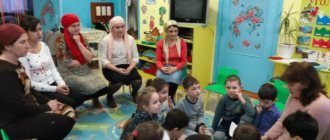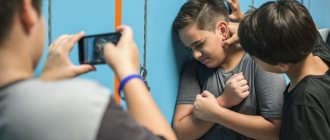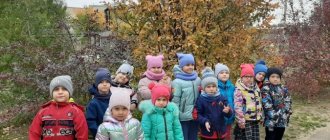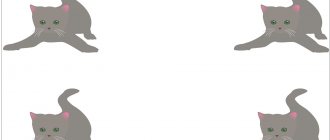Journey to the land of interesting games: a project for children of senior preschool age
Rizyapova I.I., Khabibullina V.N. Journey to the land of interesting games: a project for children of senior preschool age // Owl. 2021. N 4 (18). URL: https://kssovushka.ru/zhurnal/18/ (access date: 12/29/2021).
Order No. 431957
APPENDIX: Approximate game plan for the implementation of the project “Journey to the Land of Interesting Games”
Type of project : speech, cognitive and creative.
Implementation time: long-term.
Project participants: children 5-6 years old, 6-7 years old, teachers, parents of students.
Relevance of the topic:
Currently, the requirements of the educational system for the speech development of children have increased. The Federal State Educational Standard has defined as one of its objectives the development of the abilities and creative potential of each child as a subject of relationships with himself, other children, adults and the world. The comprehensive development of a preschooler can be achieved only on the basis of play activities, during which the child develops imagination and the symbolic function of consciousness, gains experience in communicating with peers, and comprehends moral values and rules of behavior in society.
In this regard, the issue of developing verbal creativity in preschool children using various methods and technologies is relevant.
Based on the above, goals and objectives were set for the development of verbal creativity of older preschoolers in the process of developing gaming technologies that stimulate verbal creativity and independence of children.
Goal: Development of speech creativity of preschool children in the process of play activities through inclusion in various types of activities, teach them to speak the Tatar language, develop dialogic and monologue speech.
Tasks.
Educational:
- to cultivate independence, initiative through the organization of play activities, positive relationships between children and adults.
- cultivate a desire to communicate in the Tatar language.
Educational:
- develop variable thinking, imagination and creative abilities, curiosity, observation, the ability to experiment, create conditions for the formation of fantasy, imagination, and creativity.
- improve all aspects of speech: achieve clear pronunciation of all sounds of the native language, expand and activate the vocabulary, continue to develop dialogical speech,
- develop interest in learning the Tatar language, promote speech understanding and the desire to speak and communicate in another language.
Educational:
- teach word creation;
- teach forms of monologue speech in the Tatar language;
- teach answering questions in a short and common form.
Project implementation principles:
- Accessibility: taking into account the age characteristics of children; adaptability of the material.
- Systematicity and consistency: gradual presentation of material from simple to complex; frequent repetition of acquired knowledge, rules and norms.
- Visual and entertaining: the proposed material must be understandable, have an entertaining beginning, be playful or have elements of a game or surprise.
- Dynamism: integration of the project into different activities.
- Supporting children's initiative in various activities.
- Taking into account the individual characteristics of each child.
- Introducing children to sociocultural norms, traditions of the family, society and state.
Stages of work on the project
Stage I – information and analytical support for the project.
- Collection and analysis of information.
- Selection and study of literature on project activities.
- Study of advanced pedagogical experience in developing children's ideas about play.
- Selection of methods for pedagogical diagnostics of pupils and parents (observation of children, individual conversations).
- Analysis of the results of pedagogical diagnostics.
Stage II - main
Scheme for implementing work experience in areas of development
| Directions of development | Types of games in joint activities of adults and children and independent activities of children |
| Social - communicative | Didactic, role-playing, nature history games. Board games, word games, bonding games, social interaction |
| Speech | Didactic games, speech games |
| Cognitive | Didactic games, word games, educational games, board and printed games, games with mathematical content |
| Artistic and aesthetic | Games - dramatization, games - dramatization, folk games, games - round dances, logorhythmics |
| Physical | Outdoor games with words, games with speech accompaniment, physical exercises, logarithmics, motor games. |
Stage III – final
Generalization of work experience.
Collaboration with parents
- Visual information: consultations “Speech development: games with the family”, “Games for the development of creative imagination”. Recommendations for parents “Game is serious”, “The world in a child’s creativity.” Publication of the pedagogical and parent newspaper “Krepysh”.
- Children and parents projects: “Creative workshop”, “Interesting games”, “Dreamers”, “Rhyme”.
- Step-by-step drawing: “You start, and I will continue.”
- Exhibitions of drawings: “Fairytale World”, “Abracadabra”, “Nonexistent Country”.
- Questionnaire: “Does your child like to fantasize?”
- Baby dictionary “Our children come up with it.”
- “Parents’ Diary or “Nechukovsky” from 2 to 5.”
- Competition of inventions: “Funny story”, “Changes”.
- Training “Sharing family experience.”
- Mailbox "Question and answer".
- A collection of ideas: “An unusual toy.”
- Family gatherings.
Expected result of project activities:
- To introduce children to the process of cognition through involving them in various types of practical and play activities.
- Develop cycles of game-activities for sections of the project, each of which would combine elements of different types of activities.
- Create a positive microsociety where each participant (adult and child) develops in the process of joint activity and co-creation.
- Increase the authority of the teacher and other preschool employees.
- Increase the pedagogical competence and activity of parents.
- Invite kindergarten teachers to participate in the implementation of the project to create comfortable conditions for the child.
- Teach children to speak the Tatar language, develop dialogic and monologue speech.
- Encourage parents to want to independently organize joint, creative games with their children at home.
Approximate game plan for the implementation of the project “Journey to the Land of Interesting Games” (Appendix).
Literature:
- Dyachenko O.M., Agayeva E.L. What doesn't happen in the world? 2001.
- Zaripova Z.M. Tatarcha sөylәshәbez // Methodology kullanma. Kazan, 2012.
- Karpova S.I., V.V. Mamaeva. Development of speech and cognitive abilities of preschoolers 4-5 years old // Creative Center. St. Petersburg, 2010.
- Kukushkina E.Yu., Samsonova L.V. Playing and learning to be friends // Teacher's Library. M.: Creative Center, 2013.
- Miklyaeva N.V. Interactive pedagogy in kindergarten // Library of the journal “Preschool Education Management”. M.: Creative Center, 2012.
- Miklyaeva N.V., Reshetilo E.A., Lopatina O.G. Play environment at home // Teacher's Library. M.: Creative Center, 2011.
- Miklyaeva N.V., Yu.N.Rodionova. Developing the abilities of preschoolers // Teacher's Library. M.: Creative Center, 2010.
- Penkova L.A., Konnova Z.P., Malysheva I.V., Perkova S.V. Development of play activity of preschoolers // Management. M.: Creative Center, 2010.
- Skorolupova O.A., Loginova L.V. Let's play?.. Let's play!!! From work experience. M., 2006.
- Shchetinina A.M. Teaching preschoolers to think // Teacher’s Library. M.: Creative Center, 2011.
Pedagogical project at the preschool educational institution “By playing we learn, by playing we learn!”
- February 4, 2014
Competition “My Pedagogical Initiative - 2013”
Nomination “Methodological work in preschool educational institutions”
Type of project: Gaming. Creative.
Project goal: Organizing children’s own activities in an atmosphere of mutual understanding. Own activity is the activity that the child wants to engage in and in which he: does, listens and hears, looks and speaks.
Project objectives:
1. Develop in children the skills of basic self-control and self-regulation of their actions and relationships with others.
2. Develop the individuality and intelligence of children.
3. Develop in children the skill of coordinated work.
4. Promote the accumulation of gaming experience for children by offering them various stories and ways of interacting with peers.
Project implementation period: October 2013 – May 2014.
Project participants: children; teachers; parents; representatives of society.
Educational area: “Socialization”, “Communication”, “Cognition”, “Fiction”, “Music”, “Artistic creativity”, “Safety”.
Expected Results
- Children know how to listen and hear each other, negotiate, come to agreement;
- Children develop speech interaction, memory, thinking, attention, and imagination.
- a positive attitude towards the surrounding world, other people, oneself, and peers is formed;
- children learn to defend their position and object to adults reasonably and kindly;
- their feelings of fear for making a mistake disappear.
- Teachers and parents try to maintain children’s friendships, do not interfere with their independence, and create conditions for children to communicate with each other.
Directions of work, stages. Planning
1. Preparatory stage
Working with teachers. Goals:
- arouse teachers’ interest in the project;
- introduce its tasks;
- lead to a vision of your place in the project;
- provide teachers with everything necessary for the successful implementation of the project
Interaction with parents. Goals:
- parents' interest in the project;
- give an idea of how you can participate;
- direct them to joint play activities with children.
Educational activities for preschool children. Goal: to expand preschoolers’ ideas about role-playing, creative, intellectual and theatrical games.
2. Main stage
Working with teachers. Goals:
- increasing the theoretical and practical level of professionalism of teachers;
- increasing the competence of preschool teachers in organizing gaming activities (introduction to new plot-based, role-playing and other games)
Interaction with parents. Goals:
- increasing the level of pedagogical culture of parents in the field of “Socialization” of preschool children.
- parents' interest in the problem of transferring gaming activities into the family, organizing a single gaming space.
Educational activities for preschool children. Goals:
- to help children diversify, reflect the richness of the actions of the person portrayed by the child, and clearly highlight actions aimed at different characters in the game. unfold actions in a sequence that strictly recreates real logic.
- development of cognitive interest in preschoolers, development of thinking and imagination, enrichment of children’s emotions through play.
- developing moral qualities in children: kindness, empathy, honesty, gratitude;
- nurturing respectful and caring attitude towards loved ones, sympathy, empathy;
3. Final stage
Working with teachers. Goals:
- improving the quality of gaming activity, and through it, developing interest in cognitive activity;
- systematization of accumulated teaching experience;
Interaction with parents. Goals:
- joint family games, watching plays, cartoons with children, enriching the children's home library;
- involving parents in preparing costumes and scenery for theatrical games
Educational activities for preschool children. Goals:
- development of children’s creative abilities, strengthening their desire to express in play activities (theatrical games based on a fairy tale), productive (exhibition of children’s creative works “My Favorite Game”, collective work on the construction of “The Palace of the Beast”, plasticine plastic “We are playing”), acquired knowledge , abilities, skills, to expand moral ideas about the manifestation of good and evil;
- understand the connection between the present and the future of the native land (D/I “Journey to the Past”, S/R game “Experts of the Sengileevsky Mountains Nature Reserve”, “Walk along the streets of the city of Sengileya”, “Journey along the Volga”);
- effectively develop the creative and cognitive thinking of a preschooler (literary quiz “Fairy Tales Are Our Guest”, intellectual game “Stars”).
Before the implementation of the project, parents referred to being too busy, not knowing and not being able to do anything regarding the content of the project, but the following work was carried out with them: conversations with parents: “The role of play in the development of a child’s speech”, “The role of fairy tales in raising children”, “Family theater".
A survey was conducted: “Do you like theater?”, “What games does your child play?”, consultation: “Playing fairy tales will help to cope with children’s disobedience”, “Cultivating hard work, obedience and responsibility through play”, round table “Theater games” as a means of developing children’s speech,” a competition of joint creative works between parents and children on the topic “My Favorite Game,” a parent meeting “The Role of Games in Raising Children.”
In the corner for parents there was placed a folder - a “Theater Warm-up” with photographs of children engaged in musical and theatrical activities, and a reminder for parents “Bedtime Story”.
Parents helped set up a costume room with costumes of fairy-tale characters, purchase coloring books for the group based on Russian folk tales, and printed board games based on fairy tales. They always helped in making scenery and costumes, and purchased tickets to visit the puppet theater. Parents very actively visited our “Theater Lounge”, where they watched musical performances, entertainment, concerts, celebrating the successes of their little artists: overcoming shyness, self-confidence, improving the clarity and expressiveness of speech.
Work on the project was carried out not only with parents, but also with social partners: employees of the library, museum, store, registry office, cinema post office. Children performed at a pedagogical conference, at the anniversary of the Sengileevsky district, where they read poetry, sang songs and danced, and watched a funny performance. We often go to the local museum, where we are introduced to the past of our city, its customs and traditions.
Project report
In the school preparatory group “A”, a game, creative project “By playing - we learn, by playing - we understand!” is being implemented, within the framework of which children develop gaming skills, enrich the child’s practical and gaming experience, independent play encourages preschoolers to creatively reflect reality, Moral ideas about the manifestation of good and evil are expanding.
Continuing to master the design method - a method of organizing rich children's activities, which makes it possible to expand the educational space, give it new forms, the creative and cognitive thinking of a preschooler effectively develops.
The implementation of the project is based on the implementation of the principle of unity of activities of children and teachers, cooperation with pre-school specialists and families of pupils, cooperation with social partners.
The project covers various types of play activities for preschool children. Cognitive and speech activities include plot-role-playing games, theatrical and intellectual games, excursions, targeted walks, stories, conversations, classes on topics included in the content of the project; reading the works of fellow countrymen writers. In the fine arts section, conversations are held about the wealth and beauty of the native land, conversations about the work of local artists with viewing of paintings, illustrations, and excursions to the museum. Children implement the acquired knowledge in playful and productive activities: didactic and role-playing games. drawing with colored pencils or paints of the children’s choice “Favorite Game”, designing from paper “Theater of Flowers”, appliqué using non-traditional materials “The Tale of a Pumpkin”, modeling using non-traditional materials “Theater for Babies”, etc. Children do not attend music classes They only listen to and learn songs and dances, listen to classics, but also play musical games, come up with new dance sketches for fairy-tale characters.
Parents have expanded their opportunities for cooperation with their children, and they began to listen to their opinions. Parents began to perceive themselves as more competent in organizing joint play activities for children.
The project is playful, creative, long-term. Implemented within the framework of a preschool educational institution with the involvement of family and society (library, museum, store, post office, children's art school, art house.) Work with social partners continues. Children show a need to visit the library, museum, and theater.
The project is interdisciplinary, since the game is included in educational activities for each area of education, in unregulated activities, and in walks. In everyday life, in class, on a walk, while watching TV shows, looking at illustrations, the child learns the purpose of objects, the meaning of people’s actions, the essence of their relationships, and his first emotional and moral assessments are formed. All this serves as a source for the emergence of the game’s concept and the constant enrichment of its content.
Timely changes in the gaming environment, selection of toys and gaming material that help to consolidate in the child’s memory recent impressions received in educational games, aim the preschooler at independent, creative solving of gaming problems, and encourage different ways of reproducing reality in the game.
We try to change the subject environment taking into account the practical and play experience of children. New toys for the theater, knitted by the teacher and parents, new clothes for the Atelier. A new multifunctional screen: it is both a stand for theatrical play and a screen for an adult puppet theater, a window in the screen for a children's puppet theater, and it is also a decoration for a performance.
The child in the project is a participant from the inception of the idea to the receipt of the result. Each child makes his or her own contribution to the common cause, children show initiative and individuality, see themselves in the project, evaluate their personal participation, and are convinced of the benefits of common efforts to achieve a common goal.
In order to achieve a game that is genuine, emotionally rich, and includes an intellectual solution to game problems, we try to comprehensively manage its formation, namely: to enrich the child’s practical and play experience, we organize the activities of preschoolers in increasingly complex problem play situations, taking into account their specific practical experience, as well as the play environment .
The project included plot-role-playing games developed by me: “Invitation”, “Katya’s doll’s birthday”, “Wizards of our group”, “Walk along the streets of the city of Sengileya”, “Experts of the Sengileevskie Mountains reserve”, “Journey along the Volga”, Theatrical game based on Aksakov’s fairy tale “The Scarlet Flower”, based on B. Grimm’s fairy tale “The Hare and the Hedgehog”, continuation of A. Volkov’s fairy tale “Ellie and Her Friends”. The scenarios of intellectual games turned out to be interesting: “Stars”, “Smart Men and Wise Girls”, the quiz “Fairy Tales at Our Guest”.
Application. Project.
Author: Lyudmila Lyudvigovna Meshcheryakova, teacher of the highest qualification category at the MDOU “Solnyshko”, Sengileya, Ulyanovsk region. Work experience 33 years.
Project “Games of our childhood”
Stages of work on the project:
Preparatory stage:
formulation of the problem and goals of the project, definition of the project product. Involving children and parents to participate in planning activities. Questionnaire “What do our children play?”
Practical stage
1. Increasing the level of pedagogical theoretical knowledge of parents by:
-informing parents on the following topics:
“Games with rules, their types and purpose”;
“The importance of outdoor play in the life and development of a child”;
"Play with the children"
-creating a travel folder (which you can read at home) “Features of play activities of modern preschoolers”
2. Conversations and individual (group) consultations with parents on the topics: “Games at our home”, “What and how my child plays.”
3. Parent meeting “The role of playing with rules in the development of children of senior preschool age”
4. Compilation of the collection “Games of Our Childhood” by parents
5. Design of the photo album “Playing at home”
6. Exhibition “Playing with your own hands”
Final stage:
1. Open days “Let's play together” (joint games of parents and children during specially organized activities by the teacher).
2. Awarding of families participating in the project.
3. Recording the outcome of the project in photographic materials.
4. Final conversations with parents, exchange of opinions.
Result:
The children showed an active interest in their parents’ yard games and began to independently organize them in free activities. In addition, they taught their parents to play new outdoor games with rules. Joint games promoted mutual understanding between generations; children were proud of their parents who took part in the project. Games contributed to the development of children's sociability, self-confidence, control over their emotions, developed organizational skills, and taught them to obey established rules. Parents increased pedagogical literacy in the use of games with rules in raising their children.
Application:
SAJO
A calm ball game, the mystery of the name of which you may still be trying to unravel. Develops reaction and attentiveness.
How to play
Sajo does not require many participants; two people can play, but, as is usually the case in yard games, the more players, the merrier.
Everyone silently invents a biography for themselves - here the imagination is not limited. Determined by name, age, city, favorite dish, and so on. Of course, there is room for imagination here too - categories can change and be supplemented.
The first question the driver asks is “what’s your name?” He throws the ball to the player, naming one answer with each throw. If the option is incorrect, the player hits the ball, if it is correct, he catches it. If the driver says an incomprehensible word “sajyo”, the ball also needs to be caught. If the player accidentally hits the ball at this time, the answer is considered to be the word heard during the previous throw.
Project. Development of role-playing games in the middle group of kindergarten
Project “Development of role-playing games in the middle group of kindergarten”
Author: Yulia Galimzhanovna Novoselova, teacher of State Budgetary Educational Institution Secondary School No. 276 (preschool department), Moscow Abstract: This project will be of interest to teachers of middle groups and senior preschool age groups.
The project was implemented in the middle group of a kindergarten and is aimed at developing the creative abilities and independent play activities of children, amplifying the play experience of preschoolers. Project details
Educational organization: GBOU secondary school No. 276 Preschool department group No. 6 “Dwarfs”. Project name: “Development of role-playing games in the middle group of kindergarten.” Project type: Game, creative. Implementation period: medium term (February-May 2013). Project participants: group (teachers, students).
Project goals
• Development of play as the main activity of children; • Amplification of pupils’ gaming experience; • Using the game for educational purposes.
Project objectives
• Development and enrichment of play actions with toys based on the enrichment of individual play actions; • Development and enrichment of game plots; • Formation of communication skills, with “conspiracy to play”, distribution of roles and role-playing dialogues; • Updating children’s desire to follow their role and follow the rules of the game; • Fostering friendly relationships between children, interest in a common plan and coordination of actions.
Expected Results
• Expanding children's understanding of the variety of ways to use toys, substitute objects and play activities; • Formation of skills for independent organization of the game, distribution of roles, creative development of the plot of the game; • The ability of pupils to play in an organized manner in small groups, to join in and leave the game.
Project implementation
Preparatory stage
• Defining the goals and objectives of the project;
• Study of literature, original methods; • Diagnostics of the level of development of children’s creative activity and relationships in the team; • Drawing up an action plan for the implementation of the project. As part of the preparatory stage, I diagnosed the level of development of children's creative abilities, the presence of gaming experience, communication skills and abilities for independent gaming activities. Diagnosis was carried out using the following tests: Test “Child Taking on a Role” Revealed the following results: • The desire of most children for the main role; • Conflict situations in the distribution of roles; • Limited set of game actions; • Difficulty in defining “a known rule of behavior that reflects real action and real relationships”; • Rapid loss of interest in the accepted role. The test “Stability in obedience to the game rule” revealed the following results: The game rule is not formulated, it is easily transformed at the request of the children. The test “Features of a role-playing game” revealed the following results: • The idea of the game in most cases is proposed by the teacher, rarely initiated by the children;
• Discussion (conspiracy to play) occurs in a jumbled manner, without verbal formulation of the goal of the game, limited to the distribution of roles; • The main content of the game is actions with objects, monotonous manipulations with gaming equipment, several game actions that imitate everyday relationships; • A small number of game plots: “Clinic”, “Chauffeurs”, “Family”, “Shop”; • The plot is presented in several game actions, without independent creative development; • Role-playing dialogues between children are limited to a few phrases, objective actions prevail; • Active use of toys, substitute objects, verbal designation of substitute objects in the game; • The result of the game, as a rule, is not formalized; • Involvement of the teacher in the game, in case of difficulties with the further development of the plot of the game. Main stage
Direct implementation of the project in a group: conversations, observations, reading fiction, didactic games, productive activities, theatrical games;
organizing joint or independent play activities for children with the teacher. Long-term planning of project implementation in the group First stage.
Enriching ideas about the area of activity that the child will display in the game (observations, stories, conversations and impressions). Introducing children to people, their activities (who is doing what, why. Second stage. Organizing a role-playing game (“game in preparation for the game”): 1. Determining situations of interaction between people, thinking through and composing events, the course of their development in accordance with the theme of the game; 2. Creation of an object-based play environment based on the organization of productive and artistic activities of children, co-creation with the teacher, children's collecting; 3. Joint play activity of the teacher and children. Third stage. Collective and independent play activity of children, organization of role-playing games with an imaginary partner for whom the child speaks. The final stage of the project
Drawing up a project passport, summing up the results.
Results of the project implementation in the group
• Significant expansion of gaming techniques, methods of using gaming equipment and substitute items; • Qualitative change in the level of children’s communication skills, development of role-playing dialogues, variability of characters played; • Independent initiation of the game, combining several plots, creative development of the game situation; • Successful inclusion of children in the game and successful exit from the game; desire to implement the game plan; • Children’s active position on the “realism” of the role played by all participants in the game; broadcasting the player’s “should” behavior for this role; • Significantly increased interest of pupils in role-playing games, supplementing the games with theatrical sketches of children; • Obvious educational effect: improving the culture of behavior and relationships; development of observation skills; attention to the surrounding reality; respect for the results of others and one’s own work.
List of used literature
1. Akulova O.V., Solntseva O.V. Educational field “Socialization. Game" How to work according to the "Childhood" program: Educational and methodological manual / scientific editor: A.G. Gogoberidze - St. Petersburg: LLC "CHILDREN'S PRESS PUBLISHING HOUSE", 2012. - 176 p. 2. Program FROM BIRTH TO SCHOOL. Basic general education program for preschool education / Ed. N. E. Veraksy, T. S. Komarova, M. A. Vasilyeva. - M.: MOSAIKA-SYNTHESIS, 2010. - 304 p.; 3. Role-playing games for older preschoolers: a practical guide / N. A. Vinogradova, N. V. Pozdnyakova. — 3rd ed. - M.: Iris-press, 2009. - 128 p. — (Preschool education and development); 4. Role-playing games for preschool children / N.V. Krasnoshchekova - Rostov n/D: Phoenix, 2006 - 251 p. – (School of Development).
We recommend watching:
Plot-role-playing game in the senior group of kindergarten Summary of the plot-role-playing game "Cafe" for the senior group of kindergarten Project in the middle group "On the pages of Bazhov's fairy tales" Plot-role-playing game in the senior group "Theater"
Similar articles:
Creative project in the senior group on the topic “The Mysterious World of Insects”






